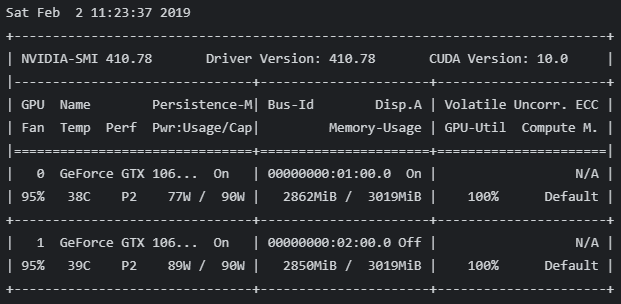My Ubuntu 18.04 installed in Windows 10 HyperV virtual machine stopped booting up with the following errors:

My Ubuntu 18.04 installed in Windows 10 HyperV virtual machine stopped booting up with the following errors:

I installed sample Oracle database schemas with the following steps:
Cloned the repository, changed the directories in the installation script, and started my docker container with the mapped folder:
sudo su - oracle
mkdir repos
cd repos
git clone https://github.com/oracle/db-sample-schemas.git
cd db-sample-schemas
perl -p -i.bak -e 's#__SUB__CWD__#'$(pwd)'#g' *.sql */*.sql */*.dat
exit
sudo docker run -d -it --rm --name oracle18se -v /home/oracle/oradata18:/opt/oracle/oradata -v /home/oracle/repos:/home/oracle/repos -p 1521:1521 -p 5500:5500 oracle/database-se:18.3.0
sudo docker logs oracle18se
In Oracle 19c the following fields of AUDIT_UNIFIED_ENABLED_POLICIES table were renamed:
So the audit options query in Oracle 19c looks like this:
SELECT up.AUDIT_OPTION, uep.SUCCESS, uep.FAILURE from AUDIT_UNIFIED_ENABLED_POLICIES uep, AUDIT_UNIFIED_POLICIES up
WHERE uep.ENTITY_NAME = 'ALL USERS' and uep.ENABLED_OPTION='BY USER' and uep.POLICY_NAME = up.POLICY_NAME and up.AUDIT_OPTION_TYPE = 'STANDARD ACTION';
To enable Unified Auditing in Oracle Database 12 and 18 on Oracle Linux I did this:
export ORACLE_SID=ORCLCDB
cd $ORACLE_HOME/bin
./sqlplus sys as sysdba
SHUTDOWN IMMEDIATE
EXIT
./lsnrctl stop
cd $ORACLE_HOME/rdbms/lib
make -f ins_rdbms.mk uniaud_on ioracle
cd $ORACLE_HOME/bin
./lsnrctl start
./sqlplus sys as sysdba
STARTUP
Clone the repository with the official Oracle docker images:
git clone https://github.com/oracle/docker-images
Install docker, download Oracle Database, put it to the directory docker-images/OracleDatabase/SingleInstance/dockerfiles/18.3.0 containing the Dockerfile and run the following commands to build and run Enterprise Edition:
cd docker-images/OracleDatabase/SingleInstance/dockerfiles/18.3.0
mv ~/Downloads/LINUX.X64_180000_db_home.zip .
# Fix a small bug in Dockerfile, see https://github.com/oracle/docker-images/issues/1468
sed -i 's/V981623-01/LINUX.X64_180000_db_home/g' Dockerfile
sudo docker build -t oracle/database:18.3.0 --build-arg DB_EDITION=EE .
sudo docker run -d -it --rm --name oracle18 oracle/database:18.3.0
sudo docker logs oracle18 --tail 100
sudo docker logs oracle18 | grep -i password
and the following commands to build and run Standard Edition 2 (it does not require V981623-01.zip):
sudo docker build -t oracle/database-se:18.3.0 --build-arg DB_EDITION=SE2 .
sudo docker run -d -it --rm --name oracle18se oracle/database-se:18.3.0
sudo docker logs oracle18se --tail 100
the first string of the docker output contains the generated password for SYS, SYSTEM and PDBADMIN.
(more…)It is still possible to mine BEAM with GeForce GTX 1060 3GB and GMiner on HiveOS. GMiner takes 2862MB on GPU0 and 2850MiB on GPU1-7:

I successfully build and run rippled 1.1.2 on Ubuntu 18.04 with the following commands:
sudo apt-get -y install git cmake pkg-config protobuf-compiler libprotobuf-dev libssl-dev wget
cd ~Downloads/
wget https://dl.bintray.com/boostorg/release/1.67.0/source/boost_1_67_0.tar.gz
cd ..
mkdir lib
cd lib/
tar xvzf ~/Downloads/boost_1_67_0.tar.gz
./bootstrap.sh
./b2 -j1
export BOOST_ROOT=/home/xrp/lib/boost_1_67_0
cd ~/repos/
git clone https://github.com/ripple/rippled.git
cd rippled
git tag
git show --summary 1.1.2
git reset --hard 1.1.2
mkdir build
cd build/
cmake ..
cmake --build .
./rippled -u
I followed the official Ubuntu time synchronization guide and installed chrony:
sudo apt update sudo apt install chrony cat /etc/chrony/chrony.conf chronyc sources chronyc sourcestats sudo systemctl restart chrony.service apt remove --autoremove chrony
After a few attempts I was able to start Ethereum Mist 0.11.1 in ‘fast’ mode on Windows 10:
it downloaded ‘geth’, connected to {“path”:”\\\\.\\pipe\\geth.ipc”} and started to sync, but when sync finished I was unable to send transactions (they were ‘denied’ for some reason).
I have 50 Mbit internet at home. If I test its speed with speedtest.net I get download speed 56 Mbit/s and upload speed 5.56 Mbit/s that is really good:

and if I download a file with torrent the speed is 6+ MB/s, but if I download a file with HTTP or SFTP the speed can be less than 500 KB/s that is 10 times slower. For example, if I download Ubuntu 18.10 on my VPS the speed is 24 MB/s: